Before I came to Korea I tried to put everything in place that I needed to continue to function financially, and keep doing my job, over 5,000 miles from home. I tried to open an account with the laughably titled 'world's local bank', HSBC, which failed, and in the maelstrom of my final weeks before leaving, a lot of other plans fell by the wayside as my house sale unexpectedly unravelled and I had to deal with the consequences of that, which finished with us stripping our kitchen floor five hours before we were supposed to get up to go to the airport in the morning.
I don't earn in Korean Won so what I make ends up in UK bank account. Since arriving, I've considered various options solve my inability to move funds from my British bank accounts, but it always comes down to being able to prove who I am, which is quite difficult when you're not in a position to provide British or Korean utility bills with your name on them, or trappings of verification that the increasingly legislated and paranoid financial industry place on their customers. The problems are only exacerbated by lack of ready access to equipment such as scanners and printers which we chose not to buy for our short stay, and in any case we had no space for in our efficiently organised (i.e. cramped) one-room apartment. All in all, it seems easier to try and sort all this out when I'm back home.
On the other hand, as much as I seem to lack a financially provable identity in Korea, my wife has the same problem in England, but circumstances are such that she wanted to open a new trading account with a British company. So in what had already proven to be a great effort up to that point, we arrived at the offices of a Korean public notary with some bills and other evidence of her financial existence and proceeded - at great expense - to have them witnessed. But since the notaries didn't speak English - or at least, weren't willing to admit that they did - our expectation that they would sign-off any translations as authentic was quickly dashed. We think we have enough to satisfy our potential service provider, but since someone half-a-world away has to be satisfied that these documents match their compliance requirements - which is a subjective judgement - we won't know until they come back to us. Maybe it's because I inevitably feel more in control on home ground, but I'm left with the feeling that it would have been easier to resolve this in the UK.
In retrospect I regret a little complacency which crept into my thoughts as the months before my departure diminished, and I wish I'd put everything in place I needed, and thought I might need, including trading accounts, bank accounts and credit cards. I came here for six months, which turned into twelve, and had I been better prepared it might have meant a less frugal lifestyle and fewer worries about the cost of the air conditioning bill during the summer.
Thursday, June 28, 2007
Tuesday, June 26, 2007
When Saturday Comes
After the now regular hospital trip Saturday morning we went over to the Nampodong district where a movie theatre was showing Hot Fuzz, which my wife really wanted to watch. Our subway train was advertising a roller-coaster ride, which might have been more worrying if I was new to the city. Although I gather that advertising on trains is common in Seoul, it's the first time I've seen such a thing in Busan, where so far the carriages have been as uniform as the trains have been punctual.
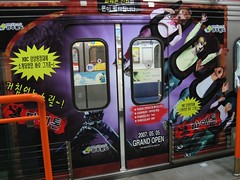
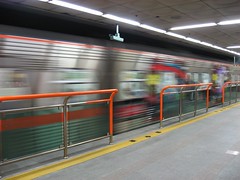
We arrived too early, and sat in an almost empty foyer on the fifth floor of the theatre doing some Korean language practice. If we'd been doing this since I came here I'd probably be fluent by now, but we've spent our time here rushing from one situation to the next and we don't seem to get many of these pauses in-between the action. A little girl came over and said "hello", but after I replied "안녕하세요" (Hello) back the conversation died and she lost interest. I should probably never teach children.
I didn't know what the Koreans would make of something as esoteric as a British action-movie parody, when just being British is strange enough without delving into any sub-genres, and it seemed neither did the Koreans because only ten of them showed up. If you were one of ten people sat in a vast theatre with hundreds of seats, where would you sit? In the centre, or off towards one of the edges? With the Koreans largely sticking to their assigned and occasionally bizarre seating (which we don't have in the UK where it's just a free-for-all), I persuaded my wife, in an undoubted act of cultural pollution, to forego our given positions and instead sit where we wanted. And even though the movie was OK, I laughed more about the absurdity of the Korean instinct to comply with the seating arrangements than anything on the screen.
I've little doubt that the film's subtleties will be lost on Korean audiences, but the disturbing nature of English country life left me feeling a little homesick for once, perhaps because I'm very much an English city dweller who can relate to it.
The monsoon rain which had started two days earlier was largely holding off much to the bemusement of the local weather forecasters, but with their sea of umbrellas the street vendors selling their food around Nampodong were prepared for anything, except the Japanese tourists we tried to help translate for while eating mandu at one of the stands.
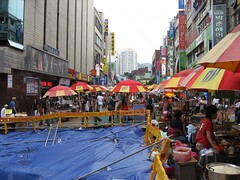
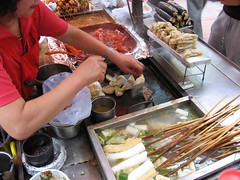
After our snack we headed back towards home where we were meeting up with a friend for lunch proper, which this time was another common Korean dish, donggaseu (pork-cutlet) with rice and vegetables. For reasons not entirely clear to me "we" had decided to go to the Songdo district afterwards. On the way we passed some Korean dancing girls bravely trying to entice ajeossis (presumably) into an electrical store, despite the rain which was finally falling.
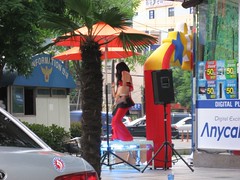
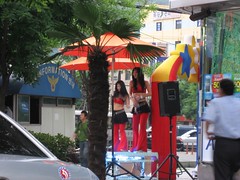
In Songdo monsoon clouds hung angrily over the bay, but the rain held off long enough for us to walk down a road full of people fishing. I've been here once before when it was freezing cold, and I think they fish whatever the weather.
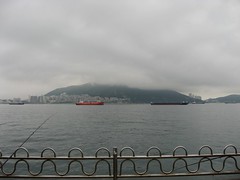
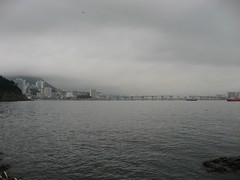
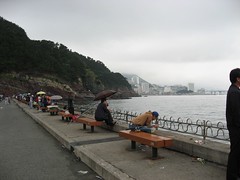
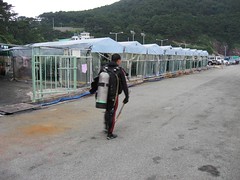
It seems that scuba diving is popular here as well - hopefully anyway. As this diver emerged from the water and trudged by us, my Korean language ability suddenly found itself in time say "북한 사람입니다" (it's a North Korean). Fortunately this time apparently funny, next time maybe it goes the other way and - given the history of uninvited incursions over the years - it turns out to be in bad taste - who says learning the language is a good idea?
Unless you want to walk here along the cliffs, the route to the fishing area is by a twisty mountain road that made us car sick on the way back. The random point we had to stop at somewhere along the cliffs turned out to have a memorial commemorating the landing of New Zealand troops in Busan on December 31st, 1950, who came to defend South Korea as part of the United Nations army during the Korean War. They stayed near Songdo before going into action. It was dumb luck that we came across it. Coincidentally, Monday was the 57th anniversary of the start of the War.
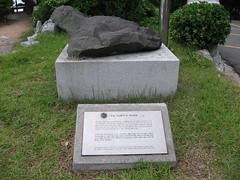
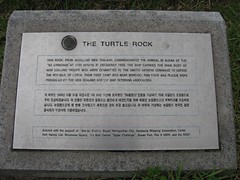
We were heading to a pool hall, and left our car in one of the vertical parking garages that are common in the city, where the vehicles are stacked by lift - space is at a premium here. In my haste to take a photo of this I dropped my camera's spare battery and only discovered this when one of the staff yelled ajeossi at me and threw it in my direction. Great - I am starting to look old.
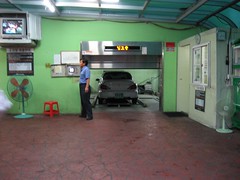
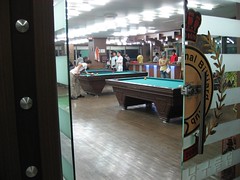
It was my first time in a pool hall here - the fabled hang-out of Korean gangsters, but while my two companions were the only women in there, it seemed a fairly relaxed non-intimidating kind of place. I often used to go play pool until 3am at a place back home while at university, and in comparison this was like a hotel - they had lights and you could see through the smoke. Not quite what was expected.
Pool appears to be called 'pocket ball' here which seems a rather odd and generic sort of title until you realise that the other game which is commonly played - a variation on billiards - is played on pocket-less tables - so in that context the 'pocket ball' name kind of makes sense. Maybe pocket-less billiards is much more popular as well, because only two of the tables were for playing pool, much to the disappointment of some Russians who came in looking for a table. They didn't stay, so I guess they didn't reckon much to the pocket-less game either.
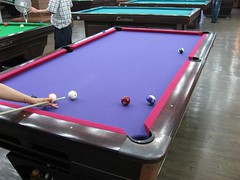
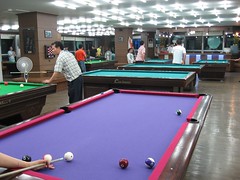
There was some thought that, at 1,200 won for every ten minutes, it was rather expensive, but it seemed roughly comparable to a DVD Bang to me.
Back down the building in the elevator, we got out on the wrong floor and found ourselves in a supermarket, where there were even more Russians. I've gathered that there are one or two areas of Busan which are popular with Russian tourists and the crews of ships which dock here, and I guess this was one of them. It's a cliché but most of them seemed to be gravitating towards the wines and spirits section, although a couple were just buying ice cream. Oddly enough, rather than a chilled cabinet, the supermarket kept its beer chilled in a tank of cold water. Different.
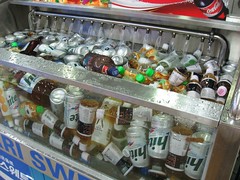
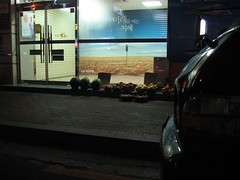
So we did some shopping before heading back towards home, where the street vendors were still plying their trade in the dark at nine in the evening. We parked up and headed for a Korean restaurant which specialised in spicy chicken, along the way passing through more street vendors one of whom greeted me with a booming "Hello!" which was met by an equally robust "안녕하세요" (Hello) back on my part - I'm getting used to this. In the restaurant the ajumma owner spotted my pale complexion in the dark and brought me a fork to supplement my chopsticks. I smiled but pressed on with the chopsticks because this is Korea, and yet another of those typical days I seem to have spent as a Korean, living at a Korean pace.


We arrived too early, and sat in an almost empty foyer on the fifth floor of the theatre doing some Korean language practice. If we'd been doing this since I came here I'd probably be fluent by now, but we've spent our time here rushing from one situation to the next and we don't seem to get many of these pauses in-between the action. A little girl came over and said "hello", but after I replied "안녕하세요" (Hello) back the conversation died and she lost interest. I should probably never teach children.
I didn't know what the Koreans would make of something as esoteric as a British action-movie parody, when just being British is strange enough without delving into any sub-genres, and it seemed neither did the Koreans because only ten of them showed up. If you were one of ten people sat in a vast theatre with hundreds of seats, where would you sit? In the centre, or off towards one of the edges? With the Koreans largely sticking to their assigned and occasionally bizarre seating (which we don't have in the UK where it's just a free-for-all), I persuaded my wife, in an undoubted act of cultural pollution, to forego our given positions and instead sit where we wanted. And even though the movie was OK, I laughed more about the absurdity of the Korean instinct to comply with the seating arrangements than anything on the screen.
I've little doubt that the film's subtleties will be lost on Korean audiences, but the disturbing nature of English country life left me feeling a little homesick for once, perhaps because I'm very much an English city dweller who can relate to it.
The monsoon rain which had started two days earlier was largely holding off much to the bemusement of the local weather forecasters, but with their sea of umbrellas the street vendors selling their food around Nampodong were prepared for anything, except the Japanese tourists we tried to help translate for while eating mandu at one of the stands.


After our snack we headed back towards home where we were meeting up with a friend for lunch proper, which this time was another common Korean dish, donggaseu (pork-cutlet) with rice and vegetables. For reasons not entirely clear to me "we" had decided to go to the Songdo district afterwards. On the way we passed some Korean dancing girls bravely trying to entice ajeossis (presumably) into an electrical store, despite the rain which was finally falling.


In Songdo monsoon clouds hung angrily over the bay, but the rain held off long enough for us to walk down a road full of people fishing. I've been here once before when it was freezing cold, and I think they fish whatever the weather.




It seems that scuba diving is popular here as well - hopefully anyway. As this diver emerged from the water and trudged by us, my Korean language ability suddenly found itself in time say "북한 사람입니다" (it's a North Korean). Fortunately this time apparently funny, next time maybe it goes the other way and - given the history of uninvited incursions over the years - it turns out to be in bad taste - who says learning the language is a good idea?
Unless you want to walk here along the cliffs, the route to the fishing area is by a twisty mountain road that made us car sick on the way back. The random point we had to stop at somewhere along the cliffs turned out to have a memorial commemorating the landing of New Zealand troops in Busan on December 31st, 1950, who came to defend South Korea as part of the United Nations army during the Korean War. They stayed near Songdo before going into action. It was dumb luck that we came across it. Coincidentally, Monday was the 57th anniversary of the start of the War.


We were heading to a pool hall, and left our car in one of the vertical parking garages that are common in the city, where the vehicles are stacked by lift - space is at a premium here. In my haste to take a photo of this I dropped my camera's spare battery and only discovered this when one of the staff yelled ajeossi at me and threw it in my direction. Great - I am starting to look old.


It was my first time in a pool hall here - the fabled hang-out of Korean gangsters, but while my two companions were the only women in there, it seemed a fairly relaxed non-intimidating kind of place. I often used to go play pool until 3am at a place back home while at university, and in comparison this was like a hotel - they had lights and you could see through the smoke. Not quite what was expected.
Pool appears to be called 'pocket ball' here which seems a rather odd and generic sort of title until you realise that the other game which is commonly played - a variation on billiards - is played on pocket-less tables - so in that context the 'pocket ball' name kind of makes sense. Maybe pocket-less billiards is much more popular as well, because only two of the tables were for playing pool, much to the disappointment of some Russians who came in looking for a table. They didn't stay, so I guess they didn't reckon much to the pocket-less game either.


There was some thought that, at 1,200 won for every ten minutes, it was rather expensive, but it seemed roughly comparable to a DVD Bang to me.
Back down the building in the elevator, we got out on the wrong floor and found ourselves in a supermarket, where there were even more Russians. I've gathered that there are one or two areas of Busan which are popular with Russian tourists and the crews of ships which dock here, and I guess this was one of them. It's a cliché but most of them seemed to be gravitating towards the wines and spirits section, although a couple were just buying ice cream. Oddly enough, rather than a chilled cabinet, the supermarket kept its beer chilled in a tank of cold water. Different.


So we did some shopping before heading back towards home, where the street vendors were still plying their trade in the dark at nine in the evening. We parked up and headed for a Korean restaurant which specialised in spicy chicken, along the way passing through more street vendors one of whom greeted me with a booming "Hello!" which was met by an equally robust "안녕하세요" (Hello) back on my part - I'm getting used to this. In the restaurant the ajumma owner spotted my pale complexion in the dark and brought me a fork to supplement my chopsticks. I smiled but pressed on with the chopsticks because this is Korea, and yet another of those typical days I seem to have spent as a Korean, living at a Korean pace.
Saturday, June 23, 2007
Fantastic Follies
“If you tell a lie big enough and keep repeating it, people will eventually come to believe it."
- Joseph Goebbels, Nazi Minister for Public Enlightenment and Propaganda, 1933-1945
As we were leaving the apartment yesterday my wife asked half-jokingly if I thought our hamsters would die if we forgot to turn the air conditioning off before going out. For a moment I thought she'd developed an overly high opinion of the machine's ability to freeze our one-room living space, but it turned out the perceived danger was 'fan death'. Fan death? Yes, it seems that leaving your aircon on, or even a simple fan, while you sleep in a sealed room can result in death from asphyxiation, poisoning, or... certainly something anyway.
I find there are times in Korea when I don't know whether to just laugh at the absurdity of some of the facts I am told, or just get angry and grind my teeth together as I dare to suggest that perhaps, just maybe, people here are not the arbiters of all that is true, and just because everyone believes something it doesn't make it right. I think in any country there's often a prevailing opinion, but in a more homogeneous society where the 'group' is more important than the individual, it becomes especially difficult to challenge established notions.
And what a notion it is, with the news media regularly updating the grim fan death statistics, and fan manufacturers careful to design auto shut-off timers into their products to avoid killing you. In fact, a forty-seven year old man died of fan death a couple of weeks ago - it's true - it was on KBS News. As Wikipedia's fan death page documents, some people go so far as to ensure they leave their car window slightly open when their vehicle's aircon is on to avoid the dreaded fan death (so why don't people die from the aircon in the sealed environment of aeroplanes?) The more you read, the funnier - or more infuriating - it gets.
So, and not for the first time, a lively debate between my wife and I followed as I attempted to find a diplomatic way of explaining that this apparent urban legend was possibly the silliest thing I'd heard all year, and the topic ended with me accepting the challenge to find evidence contrary to the accepted truth as propagated by the Korean media and society as a whole. Fortunately, this was not a task which proved particularly challenging.
But is my wife, a graduate from a fairly prestigious Korean university and the holder of a second degree from a British institution, really convinced? Naturally everything I found debunking the myth of fan death was from a non-Korean source, and herein lies another thing I've learnt while I've been here - if the rest of the world believes one thing, and Korea believes another, the people who are correct are...
- Joseph Goebbels, Nazi Minister for Public Enlightenment and Propaganda, 1933-1945
As we were leaving the apartment yesterday my wife asked half-jokingly if I thought our hamsters would die if we forgot to turn the air conditioning off before going out. For a moment I thought she'd developed an overly high opinion of the machine's ability to freeze our one-room living space, but it turned out the perceived danger was 'fan death'. Fan death? Yes, it seems that leaving your aircon on, or even a simple fan, while you sleep in a sealed room can result in death from asphyxiation, poisoning, or... certainly something anyway.
I find there are times in Korea when I don't know whether to just laugh at the absurdity of some of the facts I am told, or just get angry and grind my teeth together as I dare to suggest that perhaps, just maybe, people here are not the arbiters of all that is true, and just because everyone believes something it doesn't make it right. I think in any country there's often a prevailing opinion, but in a more homogeneous society where the 'group' is more important than the individual, it becomes especially difficult to challenge established notions.
And what a notion it is, with the news media regularly updating the grim fan death statistics, and fan manufacturers careful to design auto shut-off timers into their products to avoid killing you. In fact, a forty-seven year old man died of fan death a couple of weeks ago - it's true - it was on KBS News. As Wikipedia's fan death page documents, some people go so far as to ensure they leave their car window slightly open when their vehicle's aircon is on to avoid the dreaded fan death (so why don't people die from the aircon in the sealed environment of aeroplanes?) The more you read, the funnier - or more infuriating - it gets.
So, and not for the first time, a lively debate between my wife and I followed as I attempted to find a diplomatic way of explaining that this apparent urban legend was possibly the silliest thing I'd heard all year, and the topic ended with me accepting the challenge to find evidence contrary to the accepted truth as propagated by the Korean media and society as a whole. Fortunately, this was not a task which proved particularly challenging.
But is my wife, a graduate from a fairly prestigious Korean university and the holder of a second degree from a British institution, really convinced? Naturally everything I found debunking the myth of fan death was from a non-Korean source, and herein lies another thing I've learnt while I've been here - if the rest of the world believes one thing, and Korea believes another, the people who are correct are...
Thursday, June 21, 2007
The Monsoon
The ominous clouds hanging over one of the local mountains along with a slightly fresher feeling in the air this morning suggested that the promised monsoon season would soon be upon us. Sure enough, in the early evening the heavens opened, quickly turning the road outside into an impromptu river as sheets of rain flew through the air above it. The umbrellas that so many of the local women have taken to using as parasols quickly rediscovered their originally intended use, and men getting home on the bus from work hid using bags where they had them as they sprinted for home.
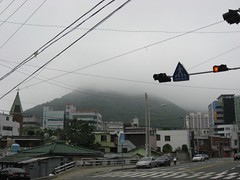
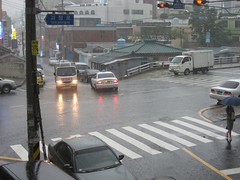

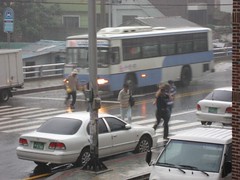
So we're supposed to have about a month of this before the 'real summer' arrives. Unfortunately, there's no relief inside our apartment where the weather remains extremely hot and stuffy. I noticed the other day that despite the heat outside Korean Mother's apartment on the thirteenth floor was relatively cool - benefiting as it does from the breeze blowing through it from one side of the building to the other. I hope if I find myself here next summer it might be in a place like that, rather than the one-room oven we currently have.




So we're supposed to have about a month of this before the 'real summer' arrives. Unfortunately, there's no relief inside our apartment where the weather remains extremely hot and stuffy. I noticed the other day that despite the heat outside Korean Mother's apartment on the thirteenth floor was relatively cool - benefiting as it does from the breeze blowing through it from one side of the building to the other. I hope if I find myself here next summer it might be in a place like that, rather than the one-room oven we currently have.
Tuesday, June 19, 2007
The Four Seasons
Apparently today is the start of summer in the Korean lunar calendar, but aside from an unseen monk loitering somewhere near our apartment chanting and banging his mogtag ('목탁') there was little to mark the occasion and in any case, it's already been uncomfortably hot for weeks. There was a lot happening in Trafalgar Square in London though. Go figure.
As time has moved on my thoughts have turned increasingly to the question of where I might base myself in the next few years, and there are no prizes for guessing that Korean Family would probably like that to be here rather than the UK. So when I complained to Korean Mother about the heat lately, it set up a rather more robust defence of the Korean weather than one might have thought necessary without this increasingly important subtext. Apparently attempting to spin something negative into a positive, she delivered her reply with the conviction of a closing defence lawyer in a trial - Korea has four seasons - and stared at me for extra effect as though somehow I would suddenly realise what a truly remarkable place this was and how I should welcome the soaring temperatures as a triumph of Korean something-or-other. So I told her that in England - where our weather is notoriously changeable - we had four seasons as well, sometimes in the space of the same week. This didn't seem to go down terribly well, and maybe not just because of the brewing subtext battle.
Of course, I've heard that Korea has four seasons before, because it is something of a running joke amongst foreigners here, but the seriousness with which it's treated is somewhat inexplicable. I might have to be careful who I explain Britain's version of the four seasons to here. Or maybe I'll just go the other way with it and start telling people that we actually have five seasons back home. Decisions, decisions.
One thing we don't have - at least not officially anyway - is a monsoon season. The forecasters here have been telling us for a few days now that Korea's month of rain will start on the 22nd, after which of course, it gets even hotter...
As time has moved on my thoughts have turned increasingly to the question of where I might base myself in the next few years, and there are no prizes for guessing that Korean Family would probably like that to be here rather than the UK. So when I complained to Korean Mother about the heat lately, it set up a rather more robust defence of the Korean weather than one might have thought necessary without this increasingly important subtext. Apparently attempting to spin something negative into a positive, she delivered her reply with the conviction of a closing defence lawyer in a trial - Korea has four seasons - and stared at me for extra effect as though somehow I would suddenly realise what a truly remarkable place this was and how I should welcome the soaring temperatures as a triumph of Korean something-or-other. So I told her that in England - where our weather is notoriously changeable - we had four seasons as well, sometimes in the space of the same week. This didn't seem to go down terribly well, and maybe not just because of the brewing subtext battle.
Of course, I've heard that Korea has four seasons before, because it is something of a running joke amongst foreigners here, but the seriousness with which it's treated is somewhat inexplicable. I might have to be careful who I explain Britain's version of the four seasons to here. Or maybe I'll just go the other way with it and start telling people that we actually have five seasons back home. Decisions, decisions.
One thing we don't have - at least not officially anyway - is a monsoon season. The forecasters here have been telling us for a few days now that Korea's month of rain will start on the 22nd, after which of course, it gets even hotter...
Sunday, June 17, 2007
Changing Habits
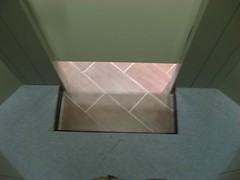 When it comes to selling things, I think it's fair to say that Koreans believe in maximising the space that they have. So there are shops everywhere, and don't think that a six-foot gap between two buildings is useless space - because it's still possible to build another shop there. A surprising number of clothes stores nearby are only big enough for one member of staff and a couple of customers at the most, in a six-by-six foot space that's also supposed to house a cash register and of course, the actual items for sale.
When it comes to selling things, I think it's fair to say that Koreans believe in maximising the space that they have. So there are shops everywhere, and don't think that a six-foot gap between two buildings is useless space - because it's still possible to build another shop there. A surprising number of clothes stores nearby are only big enough for one member of staff and a couple of customers at the most, in a six-by-six foot space that's also supposed to house a cash register and of course, the actual items for sale.But even if a store is more spacious, Korean clothing retailers often still want to maximise their selling space, and one gets the impression that such details as changing rooms are provided merely as a reluctant afterthought. So welcome to the perils of the typical shop corner changing room. The need to remove shoes before trying on some items results in some encroachment of the outside floor space into the room (you're not supposed to step on the carpeted area with your shoes), leaving a space of around 15 square inches to actually change. It wasn't easy, but I only managed to take this photo by squeezing myself into the corner and standing on my toes.
The real amusement value lies in trying to change while simultaneously avoiding tipping over the step, falling into the door and bursting out into the store beyond, presumably with your pants around your ankles for maximum hilarity, something which has in fact almost happened to me twice here, my embarrassment saved only by an entirely fortunate hand just missing the door and finding the wall next to it as I started to fall. I'm sure the day will come when my luck runs out though and some international incident is caused. But while Koreans must have got the practice of contorting their bodies in these changing rooms to a fine art, I can't help but suspect that if one day I do burst out of one unexpectedly, I won't be the first to fall foul of inherently booby-trapped design.
Clearly Korean retailers are not so bothered though. The picture above was taken in a newly completed outlet of clothing chain "So,Basic" - which tends to suggest that rethinks on the space afforded to changing rooms are just not on the agenda. But the prize for silliest changing room has to be awarded to our local Tesco supermarket - it's located in a three-by-three feet supporting column within the building, in which it's impossible to bend down.
Friday, June 15, 2007
In Praise of Older Women
One of the problems with language in certain Asian countries is that it reflects the hierarchical nature of society, and more specifically, an in-built mechanism for showing respect to one's elders. So, while you might ask a member of your peer-group to give you something in a particular way, it wouldn't be appropriate to use the same language for the same request made to a senior. That senior might be someone visibly older, or in a social setting such as a university or company, a person further along in their studies or higher up the corporate ladder. So as you move from one situation to another in Korea, you have to make decisions on where you fit in socially and what form of language to use while addressing those around you. While it's often suggested that the English language doesn't have this respectful form, I've never held that to be true; there are clearly ways to speak politely and plainly and it can have a hierarchical element - but the difference is it's not formalised.
Beyond the form of language lies the question of how one addresses one's elders, and so in Korea we have ajummas ('아줌마' - middle-aged women) and ajeoshis (or ajeossi to strictly transliterate, although this isn't the pronunciation - '아저씨' - middle-aged men). And that inevitably means that the day will come when some invisible barrier is crossed and someone will refer to you in this way. Unfortunately for my wife, that day arrived today, when a younger member of staff at the hospital addressed her like this. Ironically, while these terms may implicitly show respect, used inappropriately they can have quite the opposite effect, as her seething mood afterwards can attest to. Did she really look that old to this person? The situation had to be discussed in some detail with Korean Mother over lunch and she was partially placated by the conclusion that the staff member had made a mistake.
Amusing though I found the emerging ajumma-gate scandal, my humour diminished somewhat when I faced up to the fact that it was only a matter of time before I started getting addressed as ajeoshi/ajeossi. In fact, it's already happened once, but since the woman who referred to me in this manner was old enough to be my grandmother, it was hard to take it personally. Perhaps, as my ability to converse in Korean improves, the first time I'm referred to in this way I'll end up grinding my teeth too. Growing old in English is so much more egalitarian.
Beyond the form of language lies the question of how one addresses one's elders, and so in Korea we have ajummas ('아줌마' - middle-aged women) and ajeoshis (or ajeossi to strictly transliterate, although this isn't the pronunciation - '아저씨' - middle-aged men). And that inevitably means that the day will come when some invisible barrier is crossed and someone will refer to you in this way. Unfortunately for my wife, that day arrived today, when a younger member of staff at the hospital addressed her like this. Ironically, while these terms may implicitly show respect, used inappropriately they can have quite the opposite effect, as her seething mood afterwards can attest to. Did she really look that old to this person? The situation had to be discussed in some detail with Korean Mother over lunch and she was partially placated by the conclusion that the staff member had made a mistake.
Amusing though I found the emerging ajumma-gate scandal, my humour diminished somewhat when I faced up to the fact that it was only a matter of time before I started getting addressed as ajeoshi/ajeossi. In fact, it's already happened once, but since the woman who referred to me in this manner was old enough to be my grandmother, it was hard to take it personally. Perhaps, as my ability to converse in Korean improves, the first time I'm referred to in this way I'll end up grinding my teeth too. Growing old in English is so much more egalitarian.
Thursday, June 14, 2007
A Bug's Life
Much to the amusement of my partner, I spent a not inconsiderable amount of time during my first couple of months in Korea chasing mosquitoes around our apartment. Personally I'm rather adverse to being something else's meal while I sleep, but maybe I needn't have worried - it seemed that the foreign food on the menu was of little interest when they could eat Korean. Hold the front page - Korea Times. I was told they'd quickly disappear with the onset of winter, but I was still hearing that tell-tale buzz by my ear in the middle of the night in December. That was the last of them though, and aside from a run-in with a couple of cockroaches, we've been free of annoying bugs in the six months since... until today, when I discovered the first mosquito of the season lying in wait for me in the shower. So it looks like it's going to be open season on the insect vampires until we leave.
Wednesday, June 13, 2007
Nineteen Eighty-Four
If you were to wake up in South Korea one morning and not know where you are, you might be forgiven for thinking that you'd woken up in a totalitarian regime, because amongst the usual bustle of cars and people is the regular sound of megaphones which you imagine are imploring your obedience to the Party and the State. The fact that they're actually trying to sell you garlic, rice cakes and salt in their impassioned - and sometimes approaching hysterical - voices, only becomes clear if you can understand Korean. Even then, selling produce can take on an Orwellian quality; one of the squid sellers still runs circuits round our area demanding that the "dear patriotic citizens of Busan" demonstrate their obedience to the nation by purchasing his wares. Believe me when I say that if you aren't used to the regular sound of sales pitches and propaganda blaring out fairly constantly in the background, living here can take on a rather disturbing quality. I don't know what life must be like in the North, but the South is its alter ego in more ways than one.
But it's not all sales pitches. When they're not campaigning for office, the local government isn't above taking to the back of a truck to impart public service messages, and most disconcerting of all is the sound of the police slowly skulking around with quick blasts of their sirens and - your attention secured - barking some authoritarian commands at a population which, admittedly, seems not to care.
When I came to Korea, in the race to understand what was going on around me I sought explanations for many things I encountered, but inevitably not everything, and some aspects of life just became part of the landscape, even though I didn't understand them. But the mystery of the police was solved when they finally got my attention by pulling up under my window and letting their irritation known via their car's built-in megaphone to everyone in the vicinity. Someone had parked by the side of the building just over the narrow street from us, and even though to me it looked like a perfectly reasonable place to leave your car (by Korean standards at least), "Move your car!" were the repeated orders. So this is what they are doing - sitting in their vehicles and directing the civilian population into compliance when perceived infractions are observed. Nobody came so after a couple of minutes they actually bothered to get out, but after a brief look around they lost interest and drove off. And maybe that's where we depart from the apparent Orwellian nightmare; enforcing the law often seems to be more trouble than its worth, as the antics of Korean drivers attest to.
I still think there's every chance that eventually the near constant sound of public address propaganda - especially on market days - will drive me crazy, and the day will come when I find myself subconsciously compelled to go out and buy some of those rice cakes, as my patriotic duty.
But it's not all sales pitches. When they're not campaigning for office, the local government isn't above taking to the back of a truck to impart public service messages, and most disconcerting of all is the sound of the police slowly skulking around with quick blasts of their sirens and - your attention secured - barking some authoritarian commands at a population which, admittedly, seems not to care.
When I came to Korea, in the race to understand what was going on around me I sought explanations for many things I encountered, but inevitably not everything, and some aspects of life just became part of the landscape, even though I didn't understand them. But the mystery of the police was solved when they finally got my attention by pulling up under my window and letting their irritation known via their car's built-in megaphone to everyone in the vicinity. Someone had parked by the side of the building just over the narrow street from us, and even though to me it looked like a perfectly reasonable place to leave your car (by Korean standards at least), "Move your car!" were the repeated orders. So this is what they are doing - sitting in their vehicles and directing the civilian population into compliance when perceived infractions are observed. Nobody came so after a couple of minutes they actually bothered to get out, but after a brief look around they lost interest and drove off. And maybe that's where we depart from the apparent Orwellian nightmare; enforcing the law often seems to be more trouble than its worth, as the antics of Korean drivers attest to.
I still think there's every chance that eventually the near constant sound of public address propaganda - especially on market days - will drive me crazy, and the day will come when I find myself subconsciously compelled to go out and buy some of those rice cakes, as my patriotic duty.
Monday, June 11, 2007
Closure
News that my father's Alzheimer's appeared to have entered the final stages came at the beginning of the weekend, and with the official stamp of a poor prognosis from the attendant doctors, and the likelihood of a funeral within days, we started searching for flights back home. But they were not easy to find, and it became perhaps predictably apparent that with almost no notice, any sudden journey back to England was going to be either convoluted or expensive, and quite possibly both. To make matters worse my wife's passport is away at the British Embassy in Seoul, and I've been rather under the weather again with a patch of Meniere's, so it looked like I might be attempting that journey alone, which promised to be difficult. My wife prayed to the plate, and very much against the odds my father made some sort of recovery and began taking in fluids for the first time in days.
It's a hard thing to sit so far away from home waiting for what you think is going to be an inevitable phone call. Amongst other things I had to face up to was the idea that this might well change our plans for going to the UK in October, and perhaps we'd just move the whole schedule forward and call time on my period of living in Korea. Facing up to the end of this period, I realised I had a lot of regrets about things I hadn't yet seen and done, and no greater regret than the slow progress of my language abilities. I think it gave me a taste of how I'll feel come October if our plans ultimately remain unchanged. Alzheimer's struck my father at a relatively young age, just after I graduated from university, and since then - and with the knowledge that it can be hereditary, I've pushed myself to keep learning, on the principle that an active mind is often a healthy one in the long run. So what I perceive as my recent failures in language learning is a particularly sore point with me under the circumstances.
There may also be another health recovery story. After sitting in the apartment all weekend it was back to the hospital today for another anti-inflammatory drip and a round of physiotherapy. As I'd been feeling a little woozy each time I had the drug infusion they decided to slow down the rate today - but as I was lying on the physio's table watching the drip above me slowly do its work, I became curious about what it actually was for the first time. As a Meniere's sufferer I'm supposed to be on a strict low-sodium diet, and my drip is... isotonic sodium chloride. No wonder I've been feeling awful for a few days. If nothing else, the moral of the story is when you're in a foreign country where they don't have your medical history, make sure you know what they're treating you with. No more sodium drips for me.
It's a hard thing to sit so far away from home waiting for what you think is going to be an inevitable phone call. Amongst other things I had to face up to was the idea that this might well change our plans for going to the UK in October, and perhaps we'd just move the whole schedule forward and call time on my period of living in Korea. Facing up to the end of this period, I realised I had a lot of regrets about things I hadn't yet seen and done, and no greater regret than the slow progress of my language abilities. I think it gave me a taste of how I'll feel come October if our plans ultimately remain unchanged. Alzheimer's struck my father at a relatively young age, just after I graduated from university, and since then - and with the knowledge that it can be hereditary, I've pushed myself to keep learning, on the principle that an active mind is often a healthy one in the long run. So what I perceive as my recent failures in language learning is a particularly sore point with me under the circumstances.
There may also be another health recovery story. After sitting in the apartment all weekend it was back to the hospital today for another anti-inflammatory drip and a round of physiotherapy. As I'd been feeling a little woozy each time I had the drug infusion they decided to slow down the rate today - but as I was lying on the physio's table watching the drip above me slowly do its work, I became curious about what it actually was for the first time. As a Meniere's sufferer I'm supposed to be on a strict low-sodium diet, and my drip is... isotonic sodium chloride. No wonder I've been feeling awful for a few days. If nothing else, the moral of the story is when you're in a foreign country where they don't have your medical history, make sure you know what they're treating you with. No more sodium drips for me.
Friday, June 08, 2007
*batteries not included
We went back to the hospital today and my wife was spoiling for a fight over not being allowed to stay with me to translate with the physiotherapist, but for whatever reason the officious nurse was no longer officious and so I was finally able to understand what course of treatment I was getting and what to do at home to help bring the swelling down in my foot. I suppose it was an anti-climax after getting myself properly psyched up to try and communicate a little bit more meaningfully in Korean, but then I wouldn't trade my health just for a bit of language practice so I wasn't sorry.
Because full communication was now possible, there was something of a minor revelation though regarding - of all things - the tape that the physiotherapist had used to tape-up my foot. It seems that the hospital don't provide this very basic piece of kit so he has to provide his own - could we possibly buy some and bring it for him to use next time we came?
So while I've generally been impressed with the state of healthcare in Korea, this small issue taken at face value seems to suggest that all may not be so well for the staff that work within the system. Even the UK NHS hasn't quite got to the stage where you have to bring your own bandages.
Because full communication was now possible, there was something of a minor revelation though regarding - of all things - the tape that the physiotherapist had used to tape-up my foot. It seems that the hospital don't provide this very basic piece of kit so he has to provide his own - could we possibly buy some and bring it for him to use next time we came?
So while I've generally been impressed with the state of healthcare in Korea, this small issue taken at face value seems to suggest that all may not be so well for the staff that work within the system. Even the UK NHS hasn't quite got to the stage where you have to bring your own bandages.
Thursday, June 07, 2007
Cold Feet
I hurt my foot a while ago and although it wasn't anything that I couldn't live with the aching didn't go away, so today we went to a nearby orthopaedic hospital to get things checked. It's increasingly occurred to me of late that there's a real danger of overkill - if you'll excuse the pun - when it comes to diagnosis and treatment in Korea, but you can never fault them for trying and that has to be a good thing. Three x-rays and one anti-inflammatory IV later I'm in the physiotherapy department where a particularly officious nurse insisted that my wife should leave the treatment area in favour of the waiting room.
So when a physiotherapist turned up I was left to try and explain the symptoms in more detail. My language ability is still poor and what I have covered so far hasn't equipped me with more medical terms, therefore my attempts to tell him that my wife was Korean and she should come and translate stalled when I couldn't think of the verb 'to translate'. It appeared instead to be misconstrued as an attempt at small talk. With an increasingly typical five hours sleep behind me - I'm not coping well with sleeping in our stuffy apartment at night - my brain alternated between frustration, resignation, and bizarrely, a suddenly rediscovered ability and desire to try and explain the whole thing in Japanese. Not that my Japanese is great either - but it's a lot better than my Korean.
Fortunately the physiotherapist seemed able to draw upon his university English and somehow we struggled through the situation, though it's fair to suspect that I might not have got the most appropriate treatment given my inability to adequately explain the background and symptoms.
If I were here on my own I'd be facing these situations all the time, but my circumstances mean that in some respects I get an easy ride on the language front, but the flip side of this is that I don't learn nearly as quickly - maybe not at all from the motivated-immersion perspective - even though there's nothing quite so immersing as being stuck in a Korean family no with native-language contact beyond it.
When asked when I'd arrived here, I replied (in Korean - I was making some effort) October. But when a few moments later the question was rephrased to how many months I have been here, I replied six - because I think I stopped counting at the point I was supposed to go back to England, and at some subconscious level I don't want to believe that I've made this little progress with the Korean language in what is, in actual fact, over eight months now.
I'm due to go back for more sessions so it's to be hoped I get my head in the game before tomorrow turns into a repeat performance.
So when a physiotherapist turned up I was left to try and explain the symptoms in more detail. My language ability is still poor and what I have covered so far hasn't equipped me with more medical terms, therefore my attempts to tell him that my wife was Korean and she should come and translate stalled when I couldn't think of the verb 'to translate'. It appeared instead to be misconstrued as an attempt at small talk. With an increasingly typical five hours sleep behind me - I'm not coping well with sleeping in our stuffy apartment at night - my brain alternated between frustration, resignation, and bizarrely, a suddenly rediscovered ability and desire to try and explain the whole thing in Japanese. Not that my Japanese is great either - but it's a lot better than my Korean.
Fortunately the physiotherapist seemed able to draw upon his university English and somehow we struggled through the situation, though it's fair to suspect that I might not have got the most appropriate treatment given my inability to adequately explain the background and symptoms.
If I were here on my own I'd be facing these situations all the time, but my circumstances mean that in some respects I get an easy ride on the language front, but the flip side of this is that I don't learn nearly as quickly - maybe not at all from the motivated-immersion perspective - even though there's nothing quite so immersing as being stuck in a Korean family no with native-language contact beyond it.
When asked when I'd arrived here, I replied (in Korean - I was making some effort) October. But when a few moments later the question was rephrased to how many months I have been here, I replied six - because I think I stopped counting at the point I was supposed to go back to England, and at some subconscious level I don't want to believe that I've made this little progress with the Korean language in what is, in actual fact, over eight months now.
I'm due to go back for more sessions so it's to be hoped I get my head in the game before tomorrow turns into a repeat performance.
Tuesday, June 05, 2007
The Empire Strikes Back
Insofar as I have some reservations about some of the effects of globalisation, the irony of my own position here is not lost on me. But while I sometimes wonder about my cultural impact on the Koreans I come into regular contact with, I think the truth is that the cultural lessons have been more of a one way street in the opposite direction. After all, my inability to speak Korean, and their inability to speak English, means they are protected from some of my wilder egalitarian ideas, which I suspect this country is not ready for.
I can however today, report two small victories for the truths we hold to be sacred and self-evident back home. When I first arrived here, Korean Mother sometimes served me thin-strips of anaemic and hardly-cooked potato alongside my rice. It's been slow progress, but these have evolved to the point that I have taught her how to make chips, although this is still seen as something of an English eccentricity on my part.
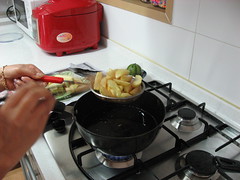
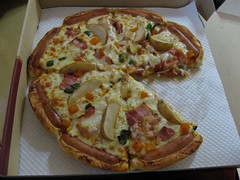
In an even more promising and potentially far-reaching development, a visit from Psychic Aunt this week coincided with a pizza delivery, and it transpired that she'd never had a piece. I respect the fact that she doesn't try to force her religion on me, so I wasn't about to force mine on her either, but she wanted to try a slice so I wasn't going to stand in the way of free will. There's something magical about watching someone try to eat pizza for the first time - the mysteries of how it should be held and eaten without burning the roof of your mouth. I had to leave her to it though because I was working. From the initial looks on her face, I didn't think I had a convert. A few minutes later though, she was asking for another piece. I think she was more surprised than I was.
I'm told that she's coming again tomorrow, and she's already planning for us to have pizza together...
I can however today, report two small victories for the truths we hold to be sacred and self-evident back home. When I first arrived here, Korean Mother sometimes served me thin-strips of anaemic and hardly-cooked potato alongside my rice. It's been slow progress, but these have evolved to the point that I have taught her how to make chips, although this is still seen as something of an English eccentricity on my part.


In an even more promising and potentially far-reaching development, a visit from Psychic Aunt this week coincided with a pizza delivery, and it transpired that she'd never had a piece. I respect the fact that she doesn't try to force her religion on me, so I wasn't about to force mine on her either, but she wanted to try a slice so I wasn't going to stand in the way of free will. There's something magical about watching someone try to eat pizza for the first time - the mysteries of how it should be held and eaten without burning the roof of your mouth. I had to leave her to it though because I was working. From the initial looks on her face, I didn't think I had a convert. A few minutes later though, she was asking for another piece. I think she was more surprised than I was.
I'm told that she's coming again tomorrow, and she's already planning for us to have pizza together...
Sunday, June 03, 2007
Battlefield Earth
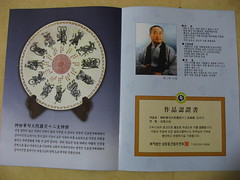 Just over 400 years ago Japan invaded Korea in the first phase of a plan to conquer China, leading to a war on the Korean peninsula that lasted the best part of seven years before the Japanese, who had enjoyed initial successes, succumbed to their inability to maintain supply lines to their homeland as a result of Korea's massive naval technology superiority in the form of its turtle ships.
Just over 400 years ago Japan invaded Korea in the first phase of a plan to conquer China, leading to a war on the Korean peninsula that lasted the best part of seven years before the Japanese, who had enjoyed initial successes, succumbed to their inability to maintain supply lines to their homeland as a result of Korea's massive naval technology superiority in the form of its turtle ships.Samurai of the day were paid by the number of kills they made, or heads taken if you will, except that they didn't take the heads but rather cut off the noses of their enemies, and sometimes the ears. It seems that by the time the Japanese gave up, between 38,000 and 100,000 ears and noses had found their way back to Japan, where they were displayed, in pickled jars, in Osaka. That wasn't all that worked its way back to Japan; 200,000 Korean artisans had been kidnapped ultimately contributing much to the cultural renaissance under the Tokugawa Shogunate, while Korea was left devastated. Most of captured Koreans never returned home - it's said that as many as 100,000 were sold as slaves to the Portugese and sent to their colonies.
Eventually though, it was the body parts that remained a problem. They came to be buried in a mound in Kyoto called Mimizuka, and 400 years later Korea wants them back, or rather given their total decomposition in the intervening period, it wants Japan to give it the surrounding dirt instead...
Korean Father had a medical recently, and while there's not much of great concern, the doctor thinks it would be a good idea if he could stop winding himself up over just about everything. More Dalai Lama and less Beat Takeshi if you will. To this end, Korean Mother dragged him along to a talk on meditation held by a famous monk. Whatever discussions on higher spirituality went on, the subject turned to the war 400 years ago and specifically, the desire to repatriate the ears and noses, or rather the few tonnes of earth that now occupy the place where they were.
In 1990 the monk successfully negotiated with the Japanese government and brought back some "soil and spirits" but since then there's been no progress. The Kyoto burial mound is guarded so while Koreans go there to visit they can't hatch a plan to liberate it bit by bit. The monk wants to build a memorial to what happened - and preferably get that soil. And that's where the plate comes in.
The monk has, it seems, been busy making plates - and bowls - as part of the effort, and these were available for the attendees to take away, free of charge. To pay for them the recipients should place their spare money in the bowl and when the amount reaches 39,900 won (about £21.73) it should be sent off to him. And there should be a total of ten payments of this amount, with the proceeds going towards the memorial. The monk personally painted the figures and writing on the plates as well as making and painting the bowls, and in that respect they have considerable artistic and aesthetic value, though their ultimate cost is not a logical one on a purely financial basis. It might seem very trusting of the monk to give these away, but people will pay of course. It's simply unthinkable not to hold up one end of a bargain with a monk, especially with as famous a one as this.
Aside from the cause, the plate depicts twelve Gods who will protect your family, and if you pray while picturing a particular person's face in the centre, they will be particularly protected. For reasons which are not entirely clear, the Gods are painted on a phosphorous coating the upshot of which is the plate glows eerily in the dark. And we have one sat by our TV now, because Korean Mother got one for herself, and one for us...
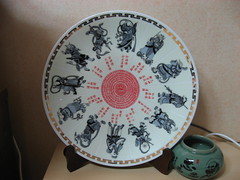
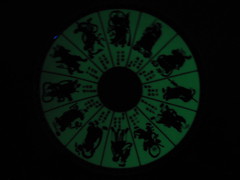
Friday, June 01, 2007
Slow Dancing in the Big City
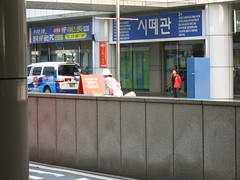 There's a curious dance of sorts which takes place on a daily basis outside some of Busan's larger stores. It's the dance of directing traffic to the store and its parking spaces, and the dancing girls who perform it stand, bow and wave their arms in what seems like a closely choreographed display of corporate presentation and endlessly repeating passacaglia.
There's a curious dance of sorts which takes place on a daily basis outside some of Busan's larger stores. It's the dance of directing traffic to the store and its parking spaces, and the dancing girls who perform it stand, bow and wave their arms in what seems like a closely choreographed display of corporate presentation and endlessly repeating passacaglia.But while all the dancing girls appear to have a common goal, not all of the dances are the same, with, as far as I have observed, variations on hand movements being a particular favourite. Today I passed a girl who shook her aloft white-gloved hands rapidly as cars left her store, perhaps as a thank you gesture, albeit a rather strange though mesmerising one. Perhaps this is her trademark and not something dreamt up in the minds of some surreal Korean middle-management meeting, and it would be nice to think there is some room for individuality in a role which strikes me as being one of the more tedious I've seen here.
This dancing girl from a few days ago isn't a big follower of the very rapid hand movement school of thinking, but is very big on bowing to the cars racing towards her, which in Korea, seems altogether too trusting when you're stuck out in the middle of the road.
Subscribe to:
Posts (Atom)